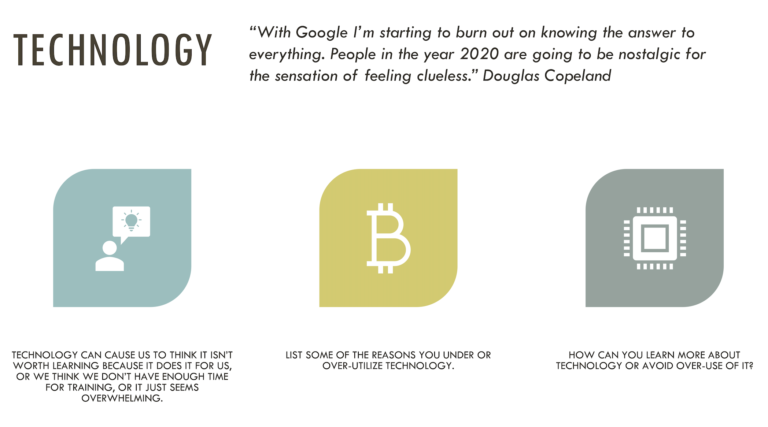Does Technology Inhibit or Enhance Our Curiosity?
When I have asked myself or others that question, the answers I got depended on whether I asked people who develop technology or people who consume technology.
The developers of technology said that they find their curiosity enhanced by the infinite possibilities that technology offers. Recall, for example, the evolution of computers over the past fifty years. In the 1960s, computing technology was housed in and mostly developed through large mainframe computers the size of a living room. As the state of the art evolved into the 1970s, the computing power of those large mainframes was condensed into desktop mini-computers a hundredth the size and ten times as powerful. Mini-computers evolved into laptops, which offered the same or more computing power in smaller, more convenient packaging. From laptops, we progressed to tablets and mobile phones, and today we have what’s referred to as wearable technology and nanotechnology.
Imagine the curiosity that resulted in the integrated circuit. Imagine Steve Jobs’ curiosity around the subject of calligraphy and his application of that curiosity to the creation of unusual computer fonts. That kind of curiosity has continued to drive the question: how do we make computing technology more accessible, faster, more powerful, more aesthetically pleasing, more secure, and more able to solve problems?
Can we even imagine how curious technologists, entrepreneurs, engineers, and bioscientists must be as they pursue the next version of a smartphone, smart kitchen, self-driving cars, or cures for diseases? Whatever the next generation of innovations may be, people will achieve it by combining the infinite wonders of technology with equally infinite doses of curiosity.
Technology’s impact on curiosity
Despite the spurring of their own curiosity by technology, some creators fear that for the rest of us, the mere consumers and beneficiaries, all the innovations may be lessening our curiosity.
Scott Hanselman [1], a Microsoft-based web technologist and teacher of computer technologies, views the world in binary terms of those who are curious and those who are not. Possibly deriving from his parents’ lessons in his childhood of a fixed mindset versus a growth mindset, he believes that the more technology advances, the more it seems like magic. This magic eliminates curiosity about how it works.
He asks in a video presentation, “Is twenty-first-century technology making it too easy? Are iPhones so magical sitting atop the last millennium of technology that it’s not worth teaching, or even wondering, how it all fits together?” He clearly defines himself as one who is curious. “I took apart my toaster, my remote control, and a clock-radio telephone before I was ten. Didn’t you?
What’s the difference between the people who take toasters apart and the folks who just want toast? At what point do kids or young adults stop asking, ‘How does it work?’ Perhaps curiosity is an innate thing; perhaps it’s taught and encouraged, but likely it’s a little of both.
“I hope you’re stretching yourself and others to ask more questions and explore the how and why of the world around you.”
“If we simply accept technologies as somehow magically providing us the answers, we have no reason to be curious about how those answers were conceived.”
“There’s an understandable concern that the instant gratification we derive from technology is making us less likely to be curious about increasingly difficult problems. By filling our brains with easy answers, we become less likely to go after complex problems.” [3]
Consumers of technology seem to have a slightly different view.
Immediate information
So, are we any smarter?
Discussion
There are many sub-components of technology including the sense that it does it for us, we are not trained enough, or find it overwhelming.List some of the reasons you under or over-utilise technology and what benefits you could experience from having high and low-tech days?
References
1. Hanselman S. Scott Hanselman – Coder, Blogger, Teacher, Speaker, Author [Internet]. Hanselman.com. 2020 [cited 11 September 2020]. Available from: https://www.hanselman.com
2. About the Founder. Web and Mobile Software Development | Websmith Studio. [cited 11 September 2020]. Available from: http://www.websmithstudio.com/about/founder
3. Karten N. Is Technology Increasing or Suppressing Curiosity?. TechWell. 2013 [cited 11 September 2020]. Available from: https://www.techwell.com/techwell-insights/2013/01/technology-increasing-or-suppressing-curiosity
4. Nicholas Carr. Nicholas Carr. [cited 11 September 2020]. Available from: http://www.nicholascarr.com
Share this
Innovative Leadership: Developing Curiosity

Innovative Leadership: Developing Curiosity


Reach your personal and professional goals
Unlock access to hundreds of expert online courses and degrees from top universities and educators to gain accredited qualifications and professional CV-building certificates.
Join over 18 million learners to launch, switch or build upon your career, all at your own pace, across a wide range of topic areas.
Register to receive updates
-
Create an account to receive our newsletter, course recommendations and promotions.
Register for free








